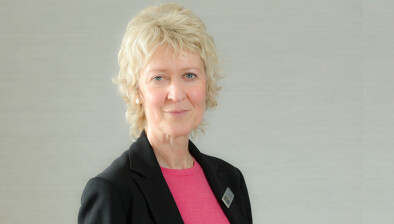Blog: Make social housing our nation’s badge of honour

If there is to be any good coming from the tragedy of Grenfell Tower, it’s that politicians, policy makers and public alike agree that we need a clear affordable housing offer for everyone, writes David Orr.
In the wake of the appalling fire at Grenfell Tower there has been a torrent of public comment, some based on evidence but much more based on assertion. One of the most common assertions has been that Grenfell proves that landlords of social housing don’t care about their tenants and think it is okay to provide poor quality, sub-standard homes.
There are, of course, no absolutes. No organisation ever gets everything right all of the time. But the idea that housing associations and local authorities don’t care about their tenants is simply not true. I meet people in all parts of the country who care deeply and who passionately want to do the right thing, driven by a strong sense of social purpose. They provide good quality homes in well-maintained places. They are building new homes, including homes for social rent, despite there being no financial support from the Government for this. Housing association homes are overall the most energy efficient, easy to heat of all sectors. Substantial sums of money are invested in creating and sustaining attractive communities and providing support to residents where it is needed.
So I’m very pleased that the Government has recognised that we need to think again about social housing and has asked Alok Sharma, the Housing Minister, to lead the discussion about what needs to change. For what it’s worth, I think a very great deal needs to change.
As I say, I think landlords do care about social housing. I’m a lot less certain that we do as a nation. The public narrative about social housing has often been corrosive – a relentless ‘othering’ of those who live in our homes. For years, proposals to build ‘affordable’ homes have been met by public apathy at best or antipathy at worst, based on unwarranted fear about who will live in the new homes. Since 2010, the Government has made it clear that no public money can be spent on new ‘social’ housing. It can only be spent on ‘affordable’ rents, based on 80% of the private market value (while housing benefit is capped not at the same 80% but at 30% of the private market) and on new homes that support owner occupation.
Alongside this, when people need to turn to benefits, they are considered to be a failure, and much of the tabloid press seems to find it impossible to use the word ‘benefit’ without ‘scrounger’ or ‘cheat’ being attached. This is despite the fact that many people in our communities who rely on benefits are working two or three low paid jobs in an effort to make ends meet and that the biggest growth in housing benefit is in payments to those in work. Time and again there are television programmes, which reinforce these stereotypes and ignore anything that challenges these preconceptions.
All of this has made it publicly acceptable to make substantial cuts in benefits to people who desperately need them. We seem to have forgotten that welfare benefits are a form of insurance, payable to any of us when we need support. We have to find a way of turning this narrative around and reconnecting with the idea that we all may find ourselves needing a bit of help.
Housing association and council tenants are, in truth, just like the rest of us – people doing their best for themselves and their families. They are doing so in what are often cripplingly difficult circumstances. In these situations, nobody should be blamed for poverty or characterised as a cheat, scrounger or failure. The population of people who live in social housing is, in overall terms, older, poorer and often more vulnerable than the general population – but that does not make them worth less than anyone else in our society.
If this is true, the profound questions are not just for providers of social housing. They are for us all. We used to have a settled national view that it is an obligation to ensure that all our citizens are adequately housed. I can’t, with my hand on my heart, say that I still believe this to be the case. We stopped thinking of housing as a public service 40 years ago, preferring to think of it as a private good. Too many times we have been content to see a structural under-supply of new homes if it meant that property values continued on their inexorable upward march.
Do we have a clear affordable housing offer for poor people? No. Do we want to? If there is to be any good coming from the tragedy of Grenfell Tower, the answer to that question, from politicians, policy makers and public alike has to be a big resounding yes.
This post was originally published by the Huffington Post.









